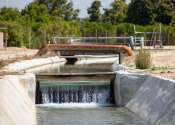Research catalogs greenhouse gas emissions tied to energy use for interbasin water transfers
Much of the water in the U.S. West is transported across vast geographical areas by large infrastructure projects known as interbasin water transfers. Two of these projects in particular make up 85% of all energy-related ...









